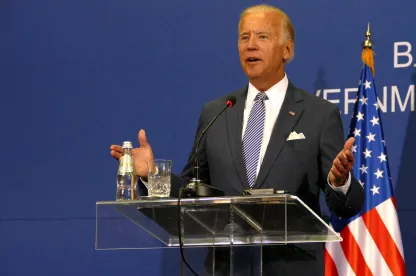On February 16, President Biden issued Executive Order 14091: Further Advancing Racial Equity and Support for Underserved Communities Through the Federal Government (“EO”), which directs federal agencies to undertake additional efforts to advance equity initiatives. This new EO targets the significant barriers still faced by underserved communities by requiring nearly every federal agency to integrate equity in their planning and decision-making. By requiring agencies to consider equity, the Biden Administration is hoping to achieve more equitable and inclusive outcomes in nearly every facet of federal programs.
This latest EO builds upon the Biden Administration’s other equity and environmental justice-related executive orders and directives, including:
-
Executive Order 13985: “Advancing Racial Equity and Support for Underserved Communities through the Federal Government,” which orders the federal government to work on redressing inequities that serve as roadblocks to equal opportunity.
-
Executive Order 13990: “Protecting Public Health and the Environment and Restoring Science To Tackle the Climate Crisis,” which promotes environmental justice (see previous VNF alert).
-
Memorandum “Modernizing Regulatory Review,” which seeks to ensure that regulations not only benefit, but also do not burden, already vulnerable, disadvantaged or marginalized communities.
-
Executive Order 14008: “Tackling the Climate Crisis at Home and Abroad,” which requires the integration of environmental justice into a whole-of-government approach and establishes the Justice40 Initiative that sets the goal that 40 percent of the overall benefits of certain federal investments flow to disadvantaged communities that are marginalized, underserved, and overburdened by pollution.
According to the White House, this latest EO furthers this equity agenda by “extending and strengthening [these] equity-advancing requirements for agencies” with the intent to deliver better outcomes. The EO lays out an ambitious range of actions and programs, from investing in rural and urban communities traditionally lacking access to the benefits of federal programs and policies, to eliminating unjust disparities in the criminal justice system, to rooting out discrimination in health and housing.
The EO outlines a multi-pronged approach to advancing equity through the federal government, including:
-
Establishing Equity-Focused Leadership Across the Federal Government. The EO requires nearly every federal agency to create “Agency Equity Teams” tasked with coordinating the implementation of equity initiatives in their programs and policies. It also establishes the White House Steering Committee on Equity, which will coordinate government-wide equity-advancement initiatives, including an annual process for agency heads to report on the implementation status of their Equity Action Plans.
-
Delivering Equitable Outcomes Through Government Policies, Programs, and Activities. In response to Executive Order 13985, agencies have developed Equity Action Plans. This EO builds on those plans by directing agencies to produce these plans annually, and beginning in September 2023, to submit them along with their annual budget submissions to the Office of Management and Budget (“OMB”). These Equity Action Plans must include several components, including: an update on progress made by each agency on “actions, performance measures, and milestones” included in the previous year’s Equity Action Plan; new or revised strategies and programs to address barriers faced by underserved communities; and a description of how each agency intends to “meaningfully engage with underserved communities.”
-
Embedding Equity into Government-Wide Processes. The EO requires the OMB Director to review its processes, including the issuance of OMB Circulars and memoranda, to support a more equitable decision-making process and to equitably distribute financial and technical assistance.
-
Delivering Equitable Outcomes in Partnership with Underserved Communities. Federal agencies are required to ramp up engagement with underserved communities that have often faced significant barriers and legacy exclusion from engaging with agencies on programs and policies that impact them.
-
Creating Economic Opportunity in Rural America and Advancing Urban Equitable Development. The EO mandates that agencies help rural communities access federal resources by providing technical assistance, supporting the creation of high-paying union jobs in rural areas, engaging rural community leaders, and contributing resources to interagency programs aimed at helping rural communities.
-
Advancing Equitable Procurement. The Small Business Administration is required to work with each federal agency to create agency-specific goals that support the government-wide goal of increasing contracting opportunities for socially and economically disadvantaged businesses (“SDBs”), defined as small businesses owned and controlled by socially and economically disadvantaged individuals. For fiscal year 2025, the government’s goal is to award 15 percent of federal procurement dollars to SDBs. The OMB is tasked with setting the government-wide goal for fiscal year 2024. In particular, agencies are tasked with expanding procurement opportunities for SDBs under the Bipartisan Infrastructure Law, the Inflation Reduction Act of 2022, and other federal financial assistance programs.
-
Affirmatively Advancing Civil Rights. Agencies are mandated to use their civil rights authorities to address discrimination, which includes “increas[ing] the effects of civil rights enforcement” and increasing public awareness of civil rights issues.
-
Further Advancing Equitable Data Practices. The EO tasks the National Science and Technology Council with coordinating implementation of the recommendations of the Interagency Working Group on Equitable Data established in Executive Order 13985. The Equitable Data Working Group was created to address inadequacies in federal data and develop a strategy for increasing data used to measure equity and diversity.
Implications
This EO’s broad range of actions to strengthen equity demonstrates the Biden Administration’s determination to hold itself accountable to disadvantaged communities. The EO’s actions and programs speak to the staffing up that has already occurred, and is continuing, across agencies to lead environmental justice efforts. The EO also seeks to ensure that disadvantaged communities fully participate in the economic opportunities presented by previous Biden Administrative actions (see previous VNF alerts for information on the Inflation Reduction Act and Bipartisan Infrastructure Law).
Public and private entities looking to secure permits or federal funding for new or continuing facilities or programs should continue taking steps to proactively prepare for environmental justice considerations in agency actions, including funding decisions. Applicants should use the Climate and Economic Justice Screening Tool (“CEJST”) issued by the Council on Environmental Quality to understand demographics and existing environmental and health burdens on communities surrounding their projects (see previous VNF alert for more information on CEJST).







 />i
/>i

